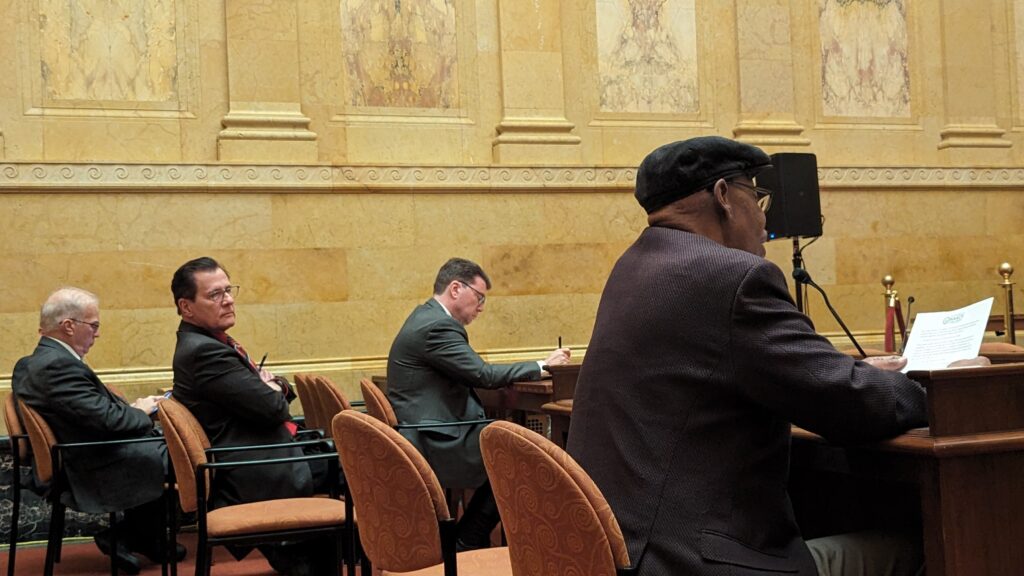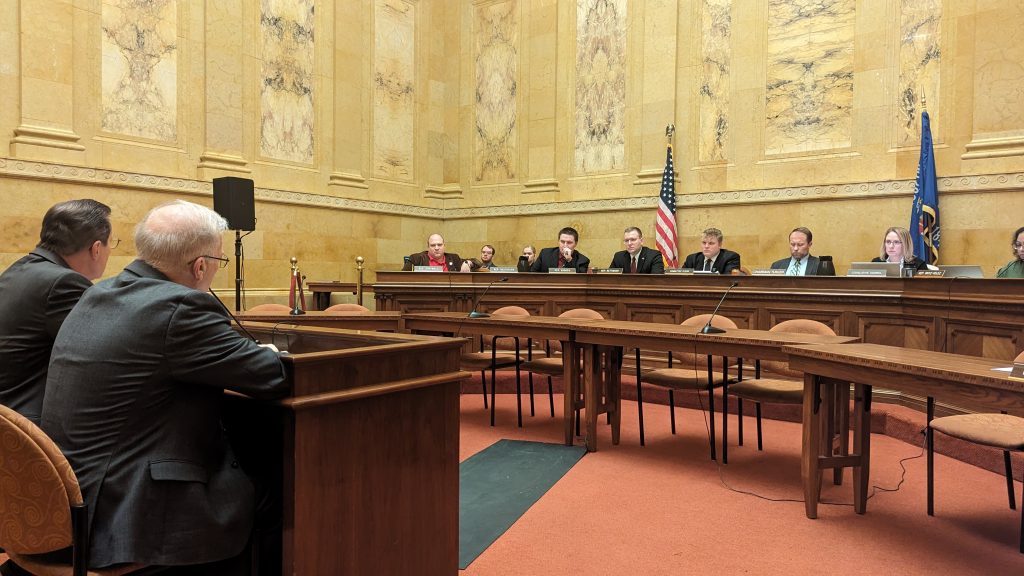Legislative Hearing a Debate Over DEI
Proposed constitutional amendment bars 'preferential treatment' by state offices, universities.

Rep. Dave Murphy looks on as President of the Dane County NAACP chapter Greg Jones testifies against the proposed amendment. (Baylor Spears | Wisconsin Examiner)
A proposed constitutional amendment limiting diversity, equity and inclusion efforts throughout Wisconsin received a public hearing on Tuesday.
The amendment — AJR 109 — would prohibit governmental entities, including the UW System, technical colleges and governmental offices and agencies, from discriminating against or granting “preferential treatment” to people and groups on the basis of race, sex, color, ethnicity or national origin in public employment, public education, public contracting or public administration.
During the hearing, the authors and supporters of the proposal, who were all white men, said it was essential to implement equality and colorblindness in Wisconsin.
Coauthor Rep. Dave Murphy (R-Greenville) told the Assembly Judiciary committee the proposal would “restore merit, fairness and equality, not only to hiring at the University of Wisconsin, but the hiring throughout all governmental entities statewide.”
Republican lawmakers have declared their intention to eliminate diversity, equity and inclusion (DEI) programs throughout the state after winning substantial concessions on the issue from the University of Wisconsin during negotiations on funding. The UW deal, which will freeze DEI hiring and realign some DEI positions, was described by Assembly Speaker Robin Vos as the “first step” towards continuing efforts to “eliminate these cancerous DEI practices.”

Coauthors Rep. Dave Murphy (R-Greenville) told the Assembly Judiciary committee the proposal would “restore merit, fairness and equality, not only to hiring at the University of Wisconsin, but the hiring throughout all governmental entities statewide.” (Baylor Spears | Wisconsin Examiner)
“Equality is different from equity in the buzzword DEI,” Murphy said on Tuesday. “Equity means everyone’s outcomes have to be the same regardless of their skills or capabilities. Equality, on the other hand, means everyone, and I mean everyone, has an equal opportunity to advance in their job based on their particular set of skills and abilities.”
Democrats on the committee questioned the proposal and the authors’ views on equity.
Rep. Jimmy Anderson (D-Fitchburg) pointed out that there are already protections against discrimination in the law. He also explained to the authors how supporters of DEI view the efforts.
Anderson spoke about how his mother, who was an immigrant from Mexico, couldn’t help him with his math homework because her education ended in elementary school.
“It became incredibly difficult for me to eventually get to the point where I was taking AP statistics. It was a lot harder. I’d have to go to after-school tutoring, and my climb up that hill was very different than some of my other more wealthy, and typically white, classmates that had more resources than I did,” Anderson said.
Anderson said that when he was applying to law school and for scholarships to school that his diversity status played a role. He said the additional help was a reflection of those difficulties and added that he thought some of those things that the authors would call preferential treatment are meant to help make the playing field more equal.
Rep. Sylvia Ortiz-Velez (D-Milwaukee) said that the resolution ignores the fact that there are inequalities within society.
“Everything isn’t equal, so if I’m starting from the 50-yard-line and you’re starting from the 75-yard-line, we’re not all starting in the same place,” Ortiz-Velez said.
Murphy said he didn’t think it was the government’s job to decide what yard line people are on, and added that he thinks there is “an assumption that this bill somehow hinders minorities and I don’t think that’s the case.”
“I think this bill adds legitimacy to every minority that becomes a high-caliber employee. I want people to not look at those people as somehow being affirmative action hires,” Murphy said.
Nass added that everything should be based on abilities and that he believes past wrongs cannot be remedied with new types of discrimination.
Ortiz-Velez, noting that she has experience working on a local level, asked the authors if they had information or a list of how the bill would affect contracting, employment and other positions, but Murphy said that he didn’t understand or have the information that Ortiz-Velez was asking for.
The amendment is based on one approved in 2006 in Michigan. Following that amendment, there was a notable decline in minority enrollment at the state’s public universities. “For example, African-American enrollment plummeted 33 percent at the University of Michigan/Ann Arbor between 2006 and 2012, even as overall enrollment grew by 10 percent,” noted the ACLU in a statement after the U.S. Supreme Court ruled the amendment was constitutional.
UW-Madison professor Ryan Owens argued that the bill was necessary to fight against discrimination against white males.
Owens, who is white, pointed to the Target of Opportunity Program at UW-Madison, which focused on helping academic departments recruit faculty who enhance the quality and diversity of the department, after this school year. It was specifically designed to “support the recruitment of outstanding faculty members among historically underrepresented groups, with a particular emphasis on race, ethnicity and gender (in disciplines where women are underrepresented).”
“The TOP program was racially discriminatory because it formally excluded white males,” Owens said. He noted that between 2018 and 2020, UW-Madison hired 25 people through the program, which included several white women but no white men. “That someone would be denied a job or more important the opportunity to compete for a job, because of his sex or the color of his skin is about as un-American as it gets.”
Owens added that he thinks public universities will find a way to “engage in the same discriminatory acts under a different name,” and that the amendment would prevent that.
President of the Dane County NAACP chapter Greg Jones, who was the only Black person to testify, said that supporters of the bill made it seem like race is being used as the single and most prevalent factor when that is not the case.
“If they’re taking race into account, it’s one factor among many,” Jones said.
Jones also spoke about his past experience working as the administrator of the state Division of Affirmative Action. He said the first year when minorities made up over 10% of new hires for the state of Wisconsin his office received calls across the state asking how that was achieved. He credited targeted outreach to minority communities and a program called a balanced interview panel.
“What we noticed was that all the interview panels were basically all white. We began to say to the agency, balance your panels, include women, include people of color,” Jones said. “What we began to see was a different outcome.”
Jones called the proposal “out of touch,” adding that it “doesn’t move Wisconsin forward.”
GOP’s latest proposal to eliminate DEI receives public hearing was originally published by Wisconsin Examiner.





















